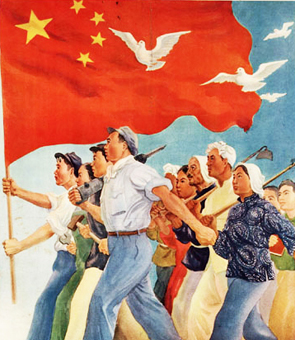Beijing Plays Kick the Can
China's next leadership change will likely be peaceful, but don't be surprised if it's not—and don't expect any major liberal reforms.
 This weekend, the three hundred most powerful leaders of the Chinese Communist Party, the Central Committee, met to discuss the economic and political future of the People’s Republic of China. International media outlets ran breathless articles about the prospects for political reform in the wake of imprisoned Chinese dissident Liu Xiaobo winning the Nobel Peace Prize and vibrant debate among Beijing intellectuals and retired officials about the merits of political reform. There is no official indication that the meeting veered from a well-vetted script focused on the next five-year plan, which begins in 2011, and the continued grooming of the “fifth generation” of leaders who will take over in late 2012. That said, maintaining stability and the prospects for political reform was undoubtedly the elephant in the room. Recently, senior retired cadres issued calls for dismantling the government’s censorship regime, while Party theorists publicly opined about the need for innovation, good governance and emancipation—all code words for democratic reforms. Undoubtedly, conservative and progressive elements of the Party were seeking to influence their respective constituencies, including the “super delegates” on the Central Committee.
This weekend, the three hundred most powerful leaders of the Chinese Communist Party, the Central Committee, met to discuss the economic and political future of the People’s Republic of China. International media outlets ran breathless articles about the prospects for political reform in the wake of imprisoned Chinese dissident Liu Xiaobo winning the Nobel Peace Prize and vibrant debate among Beijing intellectuals and retired officials about the merits of political reform. There is no official indication that the meeting veered from a well-vetted script focused on the next five-year plan, which begins in 2011, and the continued grooming of the “fifth generation” of leaders who will take over in late 2012. That said, maintaining stability and the prospects for political reform was undoubtedly the elephant in the room. Recently, senior retired cadres issued calls for dismantling the government’s censorship regime, while Party theorists publicly opined about the need for innovation, good governance and emancipation—all code words for democratic reforms. Undoubtedly, conservative and progressive elements of the Party were seeking to influence their respective constituencies, including the “super delegates” on the Central Committee.
Economic development has been at the heart of China’s strategy for maintaining political and social stability since the reform and opening period began. While it may seem archaic today, the state-planning system is alive and well in China and the central government’s five-year plan still sets the targets and priorities for the national economy. The twelfth five-year plan, scheduled to run from 2011 to 2015, is ostensibly focused on addressing domestic inequalities—urban and rural, East and West—which is expected to foster sustainability and social stability. Instead of faster growth, China’s leaders hope the buzzword for the next five years is “better growth.”
Succession politics in Beijing are as heated as they are in the United States, though they take a much different form. Delegates to the eighteenth National Party Congress in late 2012 will elect a new Central Committee, which in turn will elect a Politburo and a Politburo Standing Committee, thereby officially anointing the next generation of leaders into office. It is true the delegates vote, though the process is closer to the College of Cardinals picking a pope than Republicans or Democrats at their conventions. The top two candidates were selected ten years before the Party Congress where they would be elevated for the last time. Xi Jinping, an ally of Jiang Zemin, is expected to become president and Li Keqiang, an ally of Hu Jintao, is expected to become the premier. Such an arrangement is expected to maintain a balance between dominant Party factions and ensure the top leadership seeks a consensus for all major decisions.
In theory, this process should set the conditions whereby the Party can peacefully transfer power from one set of leaders to the next, but it would be a mistake to take the process for granted. The first and only time that the secretary of the Party transferred power without a presumed heir being arrested or dying was 2002. Today, rumors swirl in Beijing about competition between factions as patrons and protégées jockey for position. A major outcome of this weekend’s meetings was the announcement that Xi Jinping was appointed vice chairman of the Central Military Commission of the Communist Party, becoming the second civilian official on the committee along with Hu Jintao. Despite rumors, and wishful thinking that the party is considering liberal reforms, indications from these meetings are that the presumed heir remains on track to become president and the Party will kick the can of political reform a little farther down the road.
